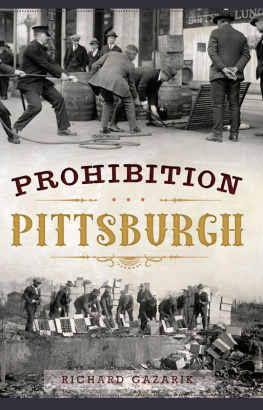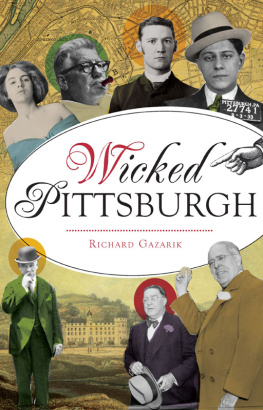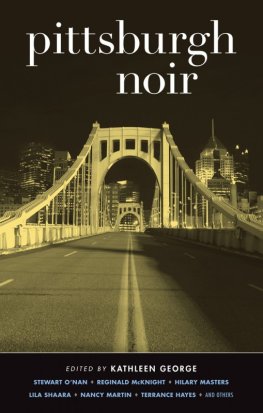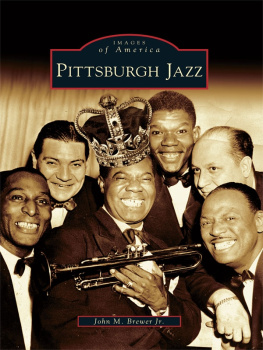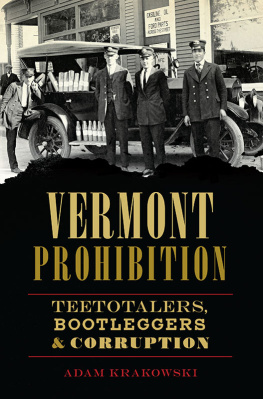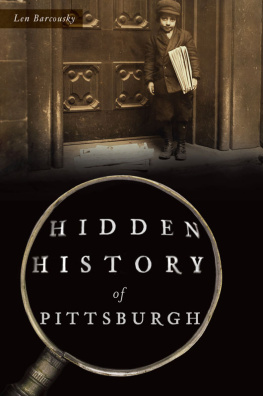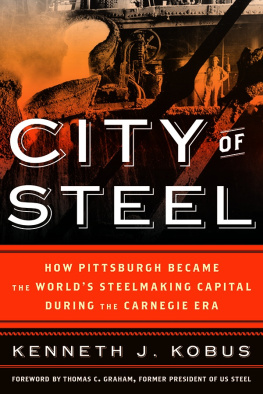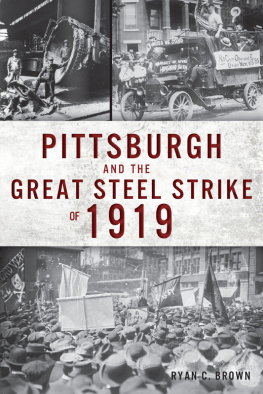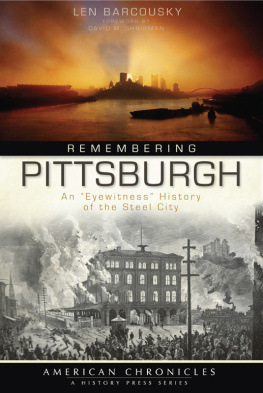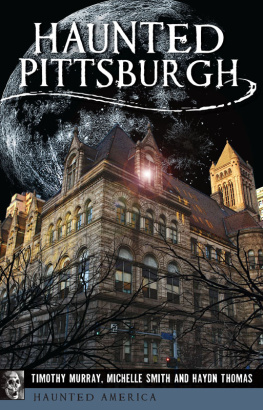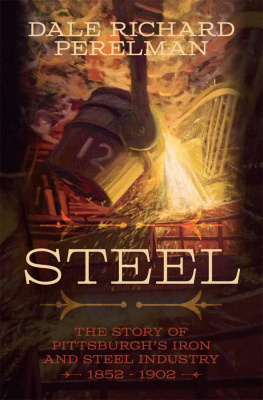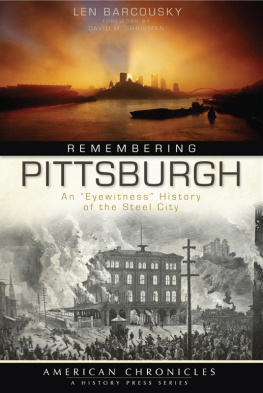

Published by The History Press
Charleston, SC
www.historypress.net
Copyright 2017 by Richard Gazarik
All rights reserved
First published 2017
e-book edition 2017
ISBN 978.1.43966.279.3
Library of Congress Control Number: 2017940923
print edition ISBN 978.1.46713.662.4
Notice: The information in this book is true and complete to the best of our knowledge. It is offered without guarantee on the part of the author or The History Press. The author and The History Press disclaim all liability in connection with the use of this book.
All rights reserved. No part of this book may be reproduced or transmitted in any form whatsoever without prior written permission from the publisher except in the case of brief quotations embodied in critical articles and reviews.
To Lucy, Katie, Adam and Kellie
Preface
Pittsburghs reputation as a shot-and-a-beer town was derived from a concoction known as a puddlers cocktail, a shot of whiskey and a glass of beer. The boilermaker was a variation of the drink, except that the shot glass of whiskey was dropped into the beer glass and allowed to settle to the bottom before drinking.
The boilermaker was a favorite drink of steelworkers, who headed for the nearest saloon when their shifts ended to wash away the days grit in their mouths. Drinking in industrial Pittsburgh was something to be done quickly, like shaving. To make it convenient for customers, some saloons had urinals built into the bar so customers could urinate without interrupting their drinking.
Pittsburgh has always been a hard-drinking town even before the Whiskey Rebellion created an uproar in western Pennsylvania. After Prohibition was repealed, Pittsburgh residents became the hardest drinkers in the state. By 1937, city residents spent $15.5 million annually on liquor, more than Philadelphia.
The Pittsburgh area has undergone a transformation since the days when blue-collar workers bellied up to the bar ordering boilermakers. Craft breweries, wineries and distilleries have created a renaissance for alcohol in the Pittsburgh area. Pennsylvanias strict liquor laws have loosened a bit to allow the sale and tasting of alcohol on site.
Pittsburgh still is a hard-drinking town. Forbes magazine rated the city eleventh on a list of the fifteen hardest-drinking cities in the United States. Drinkers have become so sophisticated that bartenders are more likely to hear a patron order a glass of California Pinot Noir, a Steel City aperitivo or a Pittsburgh Sunrise than a shot and a beer.
Acknowledgements
I may never have had the chance to write this book if Karmen Cook hadnt rejected my proposal for another project and instead asked me if Id be interested in writing a book about Prohibition in Pittsburgh. I wasnt sure if I wanted to tackle the subject because I didnt know much about the era, but after doing some preliminary research, I was surprised to learn that Prohibition-era Pittsburgh and western Pennsylvania were as violent as other major cities and that here, too, the Noble Experiment led to widespread corruption that lasted long after Prohibition was repealed. Thanks also go to Chad Rhoad and Julia Turner, who saw the work to completion.
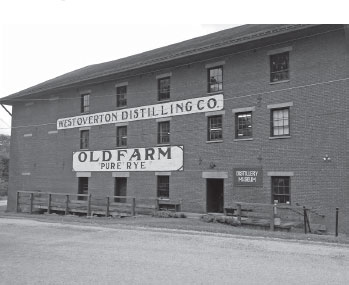
Overton Distilling Co. was once owned by Treasury secretary Andrew Mellon of Pittsburgh, who was charged with enforcing Prohibition laws. West Overton Museum and Distillery.
Steve Mellons interactive work on the murders of the Volpe brothers in the Pittsburgh Post-Gazette in 2014 served as a roadmap for this book. As with my previous book, my wife, Lucy, was invaluable in making sense out of a manuscript that sometimes meandered far afield.
The records of the Pittsburgh Brewing Co., the Womans Christian Temperance Union and Henry Clay Frick were useful in providing background, so special thanks also go to the staff at the Archives Service Center at the University of Pittsburgh for their help in retrieving records and photographs. The Pennsylvania Room of the Carnegie Library in Pittsburgh is a good starting place for research, and the staff are always helpful in producing documents and newspaper clippings of the era.
At the West Overton Distillery Museum in Scottdale, Pennsylvania, Stephanie Koller and Logan Holmes were gracious in sharing their information on the history of Old Overholt whiskey and the Overholt family.
Introduction
I was in high school when I came across an old newspaper story about an explosion that ripped apart my grandfathers house in the 1920s. The article attributed the explosion to a faulty coal furnace. I showed the item to my father, who laughed. The still blew up. Dad was making moonshine in the basement.
Both of my grandfathers liked the taste of moonshine after working long hours hunched over in cold, damp coal mines. I grew up along the Allegheny River in the industrial Allegheny Valley north of Pittsburgh, an area once dotted with coal mines, steel mills, glass factories and foundries. My grandfather Andrew Gazarik emigrated from what is now Slovakia but then was part of the Austro-Hungarian Empire. He came to America and brought his drinking habits with him.
Drinking was part of his life in a grimy, dirt-poor village in Slovakia. He likely drank home-brew called palenky, distilled from fruits. He also drank a Slovak gin known as borovicka or hriatoa beverage made from palenky, honey, butter and pork lardwhile exchanging toasts of na zdravie, to your health, with his friends.
My maternal grandfather, Zygmunt Maleski, also a coal miner, came from Szylowo, Poland, and probably drank concoctions of Polish moonshine known as bimber or ksiezycowka. His home was raided during Prohibition by agents who suspected he was operating a still, but the agents had the wrong house. They wanted the home next door.
Whenever my grandfather came home drunk, his three daughters advised my grandmother to leave tata alone. Let him sleep it off. My grandmother, a stubborn Pole, disregarded their advice. She got right up in his face, recalled an uncle. He liked his booze. He just loved to drink the moonshine. Even though she spent years owning a bar, my grandmother never tasted a drop of liquor in her life.
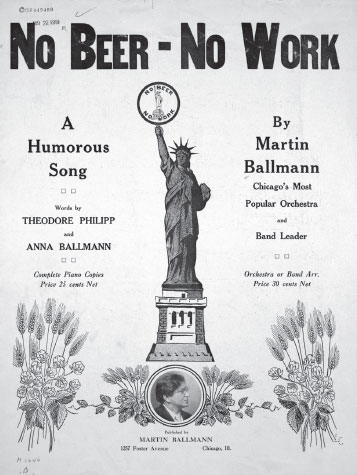
No BeerNo Work was a popular Prohibition-era song. Library of Congress.
Pittsburgh saloons were a refuge for immigrant steelworkers and coal miners; there, they could talk to their countrymen in their own tongues and feel at home. Saloons also were a place where workers could escape the drudgery of their jobs. Liquor provided relief from their long days and brutal workweeks.
The saloon was an oasis and alcohol gave momentary relief from unrelenting toil, wrote S.J. Kleinberg in his study on working-class families.
Congressman Andrew Barchfield of Pittsburgh, who was a physician, said he represented over 100,000 coal miners and steelworkers and resented temperance advocates dictating morals to his constituents.
These people look upon alcoholic liquor as a right, inborn and God given, said Barchfield in a study commissioned by the Wholesale Liquor Dealers Association. What right does a Prohibitionist in Kansas or Alabama or Maine to command a steelworker in my district who faces 2,000-degree Fahrenheit heat at the furnace door that he may not have his beer when his heat is ended?
Next page
